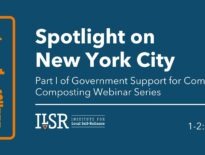With momentum from the wins for composting achieved during Maryland’s 2021 legislative session, ILSR’s Composting Initiative team supported three composting-related bills during Maryland’s 2022 legislative session, which concluded on April 11th. They are: SB0124 on school compost grants, HB1070 on a surcharge to fund waste diversion grants, and SB0229 on an on-farm composting permit exemption. With a mixed bag of successes and setbacks this year, our team continues to push to advance necessary and visionary policy on composting, waste diversion, and healthy soils in Maryland.
School Compost Grants Bill – Passed
(SB0124/HB0150) “Public Schools – Grant Program to Reduce and Compost School Waste” creates a five-year grant program for county boards and public schools to develop and implement food-waste-reduction and composting programs. Eligible projects for grant funds must include a number of factors, such as:
- Education on the environmental and societal impacts of food waste,
- Infrastructure to measure and reduce food waste,
- Training on food waste reduction and composting, and
- Implementation of an approved food waste reduction strategy (such as establishing on-site compost bins, replacing single-serve milk cartons with bulk dispensers, distributing excess food to local rescue organizations, etc.)
Priority for grant awards goes to programs that are led by students, to schools with large numbers of students who receive free or reduced-price meals, and to schools that contract with small and diverse businesses that pay their employees a living wage.
Brenda Platt, ILSR’s Composting Initiative Director advised both the Senate and House sponsors on the language for which programs are eligible for grant funding as well as to maintain a reasonably wide net of eligible recipients. She also provided input to the bill’s factsheet. Platt testified on this bill at the House Ways and Means Committee hearing on January 27, 2022 (testimony starts at 3:54:19) and at the Senate Education, Health, and Environmental Affairs Committee hearing on January 19, 2022 (testimony starts at 46:07).
According to Platt, targeting food waste in schools is a powerful opportunity to both address present-day food waste at all scales and to empower young people with sustainable solutions for future food waste:
One beauty of composting is that it ranges from small sized (a worm bin in a classroom) and medium sized (such as at farms) to large industrial sites, and everything in between… We need to teach and empower Maryland’s next generation – youth and young adults – to reduce wasted food and feed the soil. Schools are vital to teaching and demonstrating how the food we eat and toss is connected to healthy soils and protecting the climate.
– Brenda Platt, ILSR Composting Initiative Director
Read ILSR’s full testimony here.
Originally, this bill included a $500,000 annual State appropriation to fund the grant program, which was then stripped to $250,000 and fully stripped out in the final version that passed. Funding for the grant program will only come from Federal funding that the Maryland Departments of Education and of the Environment may apply for and receive.
Luckily, significant federal funding is expected soon for recycling (including composting). The bipartisan infrastructure law passed in 2021 includes 5 years of annual grant funding from both the Solid Waste Infrastructure for Recycling ($55 million per year) and the Consumer Recycling Education and Outreach ($15 million per year) programs. Maryland’s School Composting Grant program should be able to tap into these pools of money.
SB0124 is sponsored by Senator Hettleman on the Senate side, and Delegates Charkoudian and Solomon in the House. It passed both chambers during this legislative session and has been sent to the Governor to be signed into law. The Act will take effect on July 1, 2022 for five years. This bill did not originally include a sunset date. The five-year effective period was added by amendment to the final version, and will result in a repeal of the grant program on June 30, 2027.
Surcharges to Fund Waste Diversion Bill – Did Not Pass
HB1070 – “Solid Waste Disposal and Diversion and On–Farm Composting and Compost Use” would create a $30+ million per year statewide grant program to support waste prevention, reuse, repair, recycling, and composting. This grant program would be funded by a $5-per-ton surcharge at landfills, trash incinerators, and waste transfer stations. The bill includes language requiring a grant process that facilitates participation of eligible entities with limited resources, and prioritizes projects that serve low-income socially disadvantaged communities and/or projects that engage small or diverse family farm operations.
The bill is based on the best features and lessons learned from other states with similar programs, extracted from our research summarized in this article. The ILSR Composting team worked closely with the bill sponsor, Delegate Regina T. Boyce (District 43, City of Baltimore), to draft and introduce this bill. We also produced outreach materials, including a short video and factsheet, which can be found on this page.
The initial hearing in the House Environment and Transportation Committee took place on March 2, 2022. It was an overall positive hearing, with 12 oral testimonies in support of the bill, with additional written testimony submissions. Testifiers in favor included composters, farmers, Maryland Sierra Club, Chesapeake Bay Foundation, Fair Farms, NRDC, the Maryland Farm Bureau, and both Brenda Platt and Sophia Jones from ILSR. The Maryland Association of Counties testified in favor of the bill with amendments. Click HERE to watch the video of the hearing. HB1070 is introduced at timestamp 3:36:59.
This bill did not move out of Committee in the 2022 legislative session, but is expected to be taken up in the 2023 session.
Maryland has numerous policies supporting healthy soils, food waste recovery, recycling, and composting (e.g. HB 1063 on the Maryland Healthy Soils Program and HB 264 on Large Food Waste Generators in 2021) but funding for implementation and support is sorely lacking… This model is successful in numerous other states (such as New Jersey, Pennsylvania, Iowa, Ohio, Indiana, Minnesota, Wisconsin, and North Carolina) and has had positive impacts on their local communities, economies, and the environment. Why not in Maryland?
– Sophia Jones, ILSR Composting Initiative Policy Fellow
Read ILSR’s written testimony here. Our sign-on testimony was supported by 21 undersigned organizations.
On-Farm Composting Permit Exemption Bill – Did Not Pass
(SB0229/HB0184) “Environment – On-Farm Composting Facilities – Permit Exemption” would expand the area allowed for on-farm composting of food scraps without requiring a compost facility permit from 5,000 sq ft. to 40,000 sq ft., granting farmers greater autonomy to manage organic nutrient cycling on their farms and contribute to community food waste reduction efforts. This bill is sponsored by Senators Gallion, Carozza, and Hester, and by Delegate Shetty on the House side.
For context, current permit exemptions for on-farm composting can be found in COMAR 26.04.11. Current permit exemptions include operations up to 40,000 sq ft. if they only compost organic materials generated on-site (including non-routine animal mortalities), animal manure and bedding, and “Type 1 Feedstocks,” which essentially means yard waste. On-farm composting operations up to 5,000 sq ft. that process “Type 2 Feedstocks” are also exempt from permit requirements. This bill intends to increase the size limitation for certain “Type 2 Feedstocks” from 5,000 sq ft. up to 40,000 sq ft. Those are bolded in the definition below:
(COMAR 26.04.11.02)
“Type 2 feedstock means:
(a) Source-separated organics from residential curbside or drop-off programs and non-residential sources, including but not limited to pre-consumer and post-consumer food scraps and non-recyclable paper;
(b) Department-approved animal manure and bedding, with Department approval based on factors such as moisture content and pathogen risk;
(c) Department-approved industrially produced food processing materials, including industrial poultry and seafood residuals;
(d) Animal mortalities;
(e) Manufactured organic materials such as waxed-corrugated cardboard, non-coated paper, and compostable products; and
(f) Other materials that the Department determines pose a low level of risk from hazardous substances and a higher level of risk from physical contaminants and human pathogens, compared to Type 1 feedstocks.”
Linda Bilsens Brolis, ILSR’s Composting Initiative Senior Project Manager, worked closely with the bill sponsors and stakeholders on this bill, playing a major role in ensuring that the bill language specified restrictions for on-farm composting to ensure a clean and safe composting environment and product. This language allows farmers to add specific, clean, non-industrial materials from off-site to improve the composting of materials generated on the farm.
Linda also presented oral and written testimony (favorable, with amendments) for the hearing in the House Environment and Transportation Committee hearing on February 2, 2022. HB0184 is introduced at timestamp 2:00:20.
The act of composting is an essential agricultural waste management activity, it is also a practice that can provide economic benefits to farmers…There is an unprecedented opportunity to spur locally based composting and connect it to soil health, resilient food systems, and climate protection.
– Linda Bilsens Brolis (Senior Project Manager, ILSR Composting Initiative)
Read ILSR’s written testimony here.
This bill did not pass in the 2022 legislative session. A major factor in this outcome is thought to be a lack of support from the Maryland Department of Environment (MDE).
Jeremy Criss, Director of the Montgomery County Office of Agricultural Services, expressed his concern that the halting of this bill may undermine future attempts to secure this support for farmers who want to expand their on-farm composting practices:
It does not surprise me that MDE recommends the Committee not pass SB229 this year for discussions to be had in the interim whatever that means… [MDE] pushed back on amendments to the SB229 to gain new oversight authority for certain off-site type 2 feed stocks that their current regulations do not have. If SB229 does not pass, I am afraid the MDE will become more entrenched and we will experience stronger opposition anytime in the future when we try to create opportunities to expand composting.
– Jeremy Criss, Director of the Montgomery County Office of Agricultural Services
Farmer and long-time composter, Keith Ohlinger, was deeply disappointed.
This is a good bill and it is truly long overdue. It is so hard to hear about the last minute opposition and keep a positive outlook without becoming jaded. I find it ridiculous that MDE and our legislators pretend to care so much about climate change but when we hand them a simple fix on a silver platter they would rather continue to throw this stuff in the landfill and let it produce methane. I’ve been composting manure and dead animal carcasses safely for over 40 years, I think I can handle a few rotten vegetables.
– Keith Ohlinger, Porch View Farm LLC
School Waste Diversion and Disposal Infrastructure – Passed
HB566 – “School Construction – Design Documents – Waste Disposal Infrastructure” requires regulations for County boards of education to include waste disposal and diversion infrastructure, including space for trash, recyclables, food scraps, and liquid waste, in designs for new public school buildings.
This bill defines “Waste Disposal Infrastructure” as:
“A physical waste disposal line located where food is distributed that allows a student to efficiently and properly dispose of waste at the end of a meal.”
This bill was also sponsored by Delegate Boyce. Though the ILSR team did not work directly on this bill, it is another small win toward embedding waste diversion into the status quo. HB566 passed both houses and is off to the Governor, scheduled to take effect on July 1, 2022.
——————————————-





